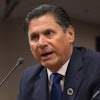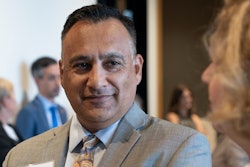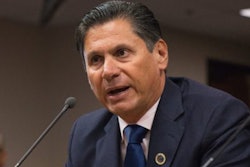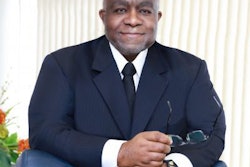Dr. Keith Curry likes to walk the campus of Compton College, the two-year school that he has led for the last 13 years — two as interim president and chief executive officer (CEO) and 11 as its permanent leader.
On this January day, Curry — who grew up just a short distance from the college — greets the groundworkers and buttonholes administrative staff about the latest developments taking place across campus.
There is much to celebrate. Construction crews are sprawled out across the 83-acre campus just 15 miles south of Los Angeles. There’s been more than $118 million in renovations and new building construction projects. Additionally, Curry has secured millions of dollars for student success initiatives. It’s a testament that the college is thriving, thanks in large part to Curry, who has been the school’s most vocal cheerleader.
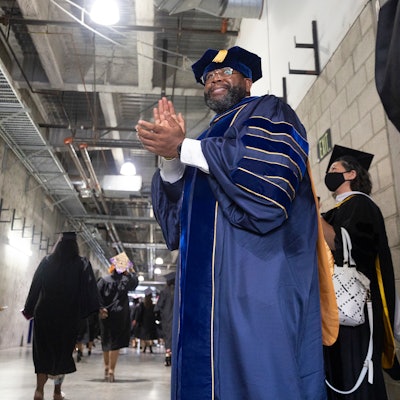 Dr. Keith CurryEddie Ruvalcaba Photography
Dr. Keith CurryEddie Ruvalcaba Photography
All the while, Curry has kept his focus on expanding equity for his students, with his sights specifically on food and housing insecurity, an issue that impacts many of his students.
In collaboration with the Los Angeles County Food Bank, Compton College offers a mobile food pantry. It launched a popular Farmer’s Market on campus last year, providing each student with $20 a week to access fresh foods and vegetables. The market regularly draws more than 700 students and plans are underway to build student housing on campus. He says he also wants to build a 24-hour urgent care facility on campus.
“Students are staying in classes because of the food resources,” says Curry, who is working with other community college leaders across the nation on replicating Compton’s successful model. “If I have students living on campus in housing and they get sick, what are we going to do, say ‘go in the morning?’”
Curry says he wants Compton College to be the most visible community college in the country at the forefront of meeting students’ basic needs.
“If I can meet your basic needs, and if I can get you here because of basic needs, I can get you out of here,” he says.
It’s that kind of attention that has drawn Curry widespread accolades as a transformative leader.
“Keith leans hard into the daily work of supporting students and the communities that love them, always asking the most challenging questions and saying the quiet parts out loud,” says Dr. Sara Goldrick-Rab, a prominent researcher and author of Paying the Price: College Costs, Financial Aid, and the Betrayal of the American Dream. “He’s why Americans should have hope for higher education and advocate for more investments in leaders who walk their talk.”
Goldrick-Rab says that what began as a working relationship with Curry has evolved into a deep friendship.
“He’s a real-life Equity Avenger, grinding 24/7 against injustice and setting an example for us all,” she says.
Pathway to the presidency
Growing up in Compton, there was no question that Curry, who was the youngest of his siblings, would go off to college. He headed to University of California Santa Cruz, where at the age of 19, he created a program called “Destination Higher Education,” a student-initiated outreach program for admitted African American students, providing students with an opportunity to learn more about the institution and to network with other students.
The transition to college was not easy. Curry recalls failing one class and remembers an English instructor telling him that it was unlikely that he would graduate from college because he did not write well.
Those critiques, he says, only forced him to work harder. He did not want to return home without a degree.
After he graduated from UC Santa Cruz, Curry landed a job at University of California Irvine’s Center for Educational Partnerships, doing outreach at Compton Unified School District, helping students go to college.
In 2005, Curry took a job at Compton College in an entry-level position within student services, ultimately working his way through the ranks of leadership to become interim president in 2011.
 Dr. Keith Curry works with other community college leaders across the nation to replicate Compton College’s strategies toward addressing food and housing insecurity.Eddie Ruvalcaba Photography
Dr. Keith Curry works with other community college leaders across the nation to replicate Compton College’s strategies toward addressing food and housing insecurity.Eddie Ruvalcaba Photography
“You’re not going to be able to attract people of color if they can’t buy homes or live within the community at an affordable rate,” says Curry. “When we talk about equity, it’s not just equity for our students, but it’s about our employees as well.”
Curry wants to see the enrollment numbers, which now hover around 7,000 students, increase to about 13,000 and says more work can be done to strengthen a transfer pipeline. He adds that the partnership between Compton College and California State University Dominguez Hills has been successful over the years.
A new dual enrollment program soon will enable area high school students to take classes not only at Compton College but also at Cal State Dominguez Hills.
“Every student is a success story,” says Curry. “Our job is to help build out that story. That means that you have to have the systems and structures to support those students in order for them to be successful.”
Listening to others
Curry says he knows that many of his students might not transfer to a four-year college, and he’s okay with that. He says he wants, however, to provide them with the skills necessary so that they can compete in the workforce.
“We need to be more intentional at saying, ‘This is our major; how does this major connect to a job?’ How do we get those businesses to look at our curriculum and say, ‘this is what we’re looking for our future employees,’ and make sure that our faculty are connecting that to our curriculum.”
Curry isn’t just talking about career and technical education (CTE) programs.
“Workforce development is all of our programs,” he says, adding that the restructuring of the college’s Guided Pathways programs has proven successful.
More than anything, Curry says, his role requires that he listens to his students, but also to staffers, employers, and members of the surrounding community.
His bold approach has not won over everyone. He has survived a vote of no-confidence by the school’s Academic Senate.
“Sometimes you ruffle feathers when you’re really doing this equity work and when you focus on student success,” he says. “I just don’t take none of this stuff personal. I focus on what is important and that’s our students, because for some of our students, we’re the last hope. This is it.”
Curry has joined forces with Dr. Tammeil Gilkerson, chancellor of Peralta Community College District, and Dr. Pamela Luster, president emerita at San Diego Mesa College. The trio call themselves the Equity Avengers.
The three have been on a mission to “engage, educate, and empower higher education organizations and individuals to eliminate student opportunity and outcome gaps by cultivating partnerships and resources necessary to embed racial equity, critical humility, and learning across our systems.”
Equity Avengers came to be through leadership and relationship-building, says Luster, who is now president and CEO of Luster Higher Ed Group.
“When Keith’s entrepreneurial approach to advocacy met my experience in administration, student services, and instruction, we recognized in one another the will and commitment to disrupting the status quo,” she says. “This energized our partnership and evolved to be the continuum of the work happening today. It takes leaders who know how to cultivate relationships to create a movement, and Keith Curry is that leader.”
Gilkerson agrees.
“Equity-minded leadership requires vision and always centering our students and communities with the commitment to listen and arrive with critical humility,” says Gilkerson. “No one emulates that better than Keith Curry, the 12-year-old Ball Boy from Compton who is now president/CEO of Compton College and a nationally recognized leader in higher education and advancing racial equity.”




